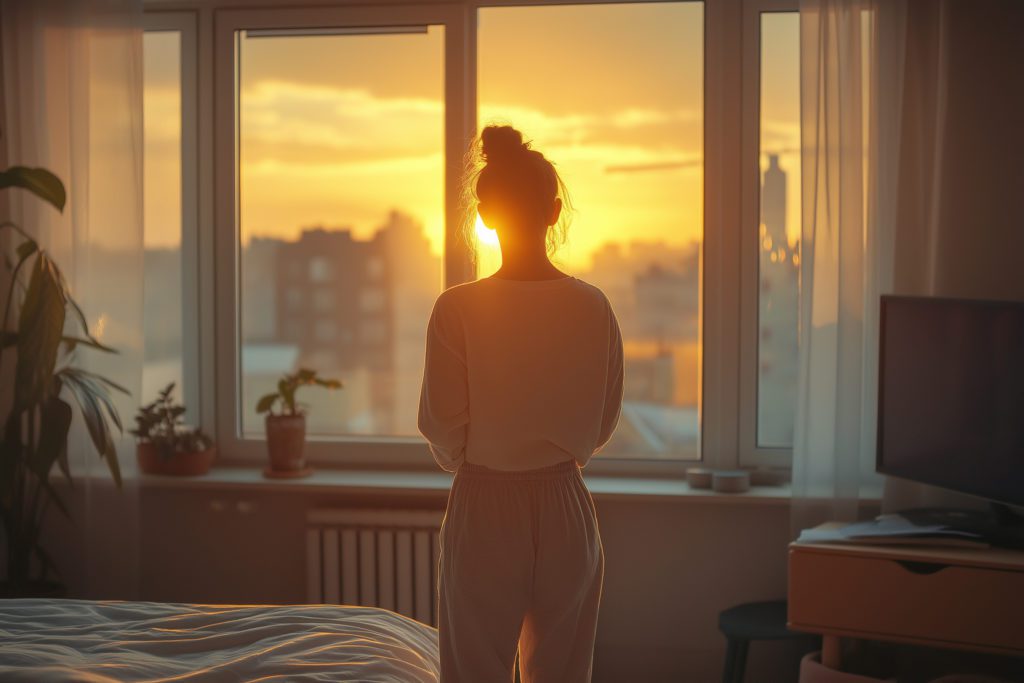
How to Wake Up Without Sleeping Through Your Alarm
Sleeping through your alarm or pressing the snooze button can sour your day. Explore why you have a hard time waking up and tips to make mornings easier.

Mornings can be rough. Sometimes, you start your day on a bad foot simply because you sleep straight through your alarm, and the late rise then leads to a hectic morning and stressful day. For people who sleep through their alarm often, it may be mind-boggling how there are people who don’t, let alone those who wake up before it even goes off.
If you find yourself continually sleeping through your alarm, there are steps you can take to wake up easier, setting your day up for a great start.
Why Do I Sleep Through My Alarm?
Before exploring tips for waking up to your alarm, it is first important to understand the reasons why you may be sleeping through it—understanding the why can help you address it in the right way.
You’re a Heavy Sleeper
If you’re sleeping through your alarm because you never hear it go off, you may be a naturally heavy sleeper. It’s not just a saying; research proposes that those who are heavy sleepers experience a greater number of sleep spindles, which are a type of brain activity that peaks in non-rapid eye movement (NREM) sleep, one stage of which is also known as deep sleep.
These spindles essentially block out noise in your surroundings so that you do not wake up while sleeping. However, this also means that if your alarm is blaring, your brain does an excellent job of blocking out the noise, making it difficult for the alarm to wake you up.
Your Sleep Routine
It’s not just the quality of being a heavy sleeper that can make it hard for you to wake in the morning; sometimes, we hear our alarms go off but find it impossible to avoid pressing the snooze button. When this occurs, your quality and amount of sleep may be to blame. Essentially, if you’re not getting enough sleep each night, your body resists getting up in the morning because it knows that more sleep is needed for it to reach its maximum functionality.
However, your chronotype may also play into your sleep habits, with problems specifically arising if you go against your chronotype. Your chronotype refers to the natural hours of sleep/ productivity that your body favors, and it can typically be categorized into three types: morning larks, hummingbirds, and night owls. If you’re trying to wake up before your ideal wake-up time, you may find yourself in a deeper stage of sleep, which can increase grogginess when you wake up. This grogginess makes it all too easy to ignore the alarm in favor of a bit more sleep.
Health Conditions
Sometimes, your health and the presence of various medical conditions may make it hard for you to wake up in the morning. For instance, those with cardiac rhythm sleep disorders have a hard time developing a regular sleeping pattern. As a result, they may enter a deeper stage of sleep that is hard to wake from.
Other sleep disorders, such as sleepwalking, night terrors, and sleep apnea, can cause sleep disruptions during the night, increasing your sleepiness come morning.
Mental health can also affect sleep, with one of the more common symptoms of depression—affecting 40% of young adults—being hypersomnia (oversleeping). This may result from difficulty falling asleep at night, which makes it hard to get up in the morning. Along these same lines, anxiety and stress can also make going to bed harder, translating to a harder time waking up in the morning.
Tips to Avoid Sleeping Through Your Alarm
If you’ve slept through your alarm one too many times and are ready to take back your mornings, the following tips are a great place to start.
Improve Your Sleep Routine
All beings are creatures of habit, and we’re no different. Our bodies already follow a standard sleep/wake cycle called the circadian rhythm, but it’s all too easy for us to fall out of line with this rhythm, causing disruptions.
If you’re having a hard time waking up in the morning, it is often best to first focus on your sleep hygiene and bedtime routine to ensure that you are not unintentionally sabotaging your sleep. Instead, you want to nurture your circadian rhythm in order to sleep better.
Try focusing on the following:
- Going to bed and waking up at the same time each day
- Ensuring you get between 7 to 9 hours of sleep each night
- Avoiding caffeine in the evening
- Completing relaxing activities before bed, such as journaling or reading a book
- Avoiding electronics before bed
Give Yourself Something to Look Forward to
If you’re only waking up to go to school or work, you may be less inclined to want to get out of bed in the morning, especially when it is so warm under the covers. However, if you plan something intriguing, you may be more inclined to get out of bed when the alarm sounds.
Consider having a delicious morning beverage or breakfast that you’re excited about. Or, plan a morning hangout with a friend at a favorite breakfast spot or a morning session of your favorite exercise class. Another option is to allow an activity only if you get up on time, such as a few minutes to watch TV or read a favorite book. Consider it a reward for waking up on time.
Change Your Alarm
Gone are the days when the traditional alarm is your only option. Now, there are a variety of alarm options that can help you get out of bed.
Some alarms have extra loud settings, and others may run around on wheels if you snooze too many times. Other alarms use the power of light to gradually rouse you from sleep, which may help fight grogginess when you wake up.
Another option is to use an alarm, such as Pillow, that wakes you up during your lightest sleep stages. If you have a habit of not hearing your alarm, this may be the key to being awoken when you’re more likely to hear it.
In all cases, consider putting your alarm across your room rather than right beside your bed so that you have to get out of bed to turn it off. This action may be enough to keep you from going back to sleep.
It’s Not Alarming to Get Good Sleep
If you continually find yourself sleeping through your alarm, whether it’s because you don’t hear it or cannot avoid pressing the snooze button one (or four) times, it can affect your mornings and, consequently, the rest of your day.
To wake up to your alarm, consider altering your sleep routine, improving your sleep hygiene, finding something to look forward to in the morning, and changing your alarm. By implementing these habits, you can get more restful sleep at night so that when your alarm goes off in the morning, you’re ready to start your day.
FAQ
Why do I keep waking up just before my alarm goes off?
Your body’s internal clock (circadian rhythm) anticipates your usual wake-up time. If your schedule is consistent, cortisol is released before waking, naturally making you feel alert. Over time, your brain learns when to wake up, often just before your alarm sounds.
Is it better to wake up naturally rather than using an alarm?
Waking up naturally is ideal because it means you’re completing a full sleep cycle. Alarms can wake you abruptly, causing grogginess. If you need one, try setting it for the end of a sleep cycle or use a gradual wake-up alarm to ease the transition into wakefulness.
Can using multiple alarms help me wake up on time?
Multiple alarms encourage snoozing, disrupting sleep cycles and leading to morning grogginess as your body never fully wakes up, making you feel sluggish. A single alarm, combined with good sleep hygiene and consistent wake-up times, is far more effective for feeling refreshed.
Does using a sunrise alarm clock really make waking up easier?
Yes, sunrise alarm clocks simulate natural dawn by gradually increasing light intensity. This helps regulate melatonin levels, making wake-up time feel more natural. Unlike sudden, loud alarms, they allow a smoother transition from sleep to wakefulness, reducing grogginess.
How does my bedtime impact my ability to wake up on time?
A regular bedtime keeps your circadian rhythm stable, making wake-ups easier. Going to sleep at different times disrupts sleep cycles, leading to inconsistent energy levels. Sticking to a consistent schedule, even on weekends, helps you feel more refreshed and alert in the morning.
Can weekend sleep-ins ruin my ability to wake up on time during the week?
Yes, sleeping in too long on weekends shifts your internal clock, making early wake-ups harder. This “social jet lag” can leave you groggy on Mondays. Keeping weekend wake-up times within an hour of your weekday schedule helps maintain a steady sleep pattern and energy levels.

Written by
Jessica G
Medical writer freelancer who has written hundreds of articles on varying topics. Masters of Engineering degree in Biomedical Engineering.
Download Pillow
Get help
Press & News
Legal
Connect
X (Twitter)
Company
Copyright © Neybox Digital Ltd.



